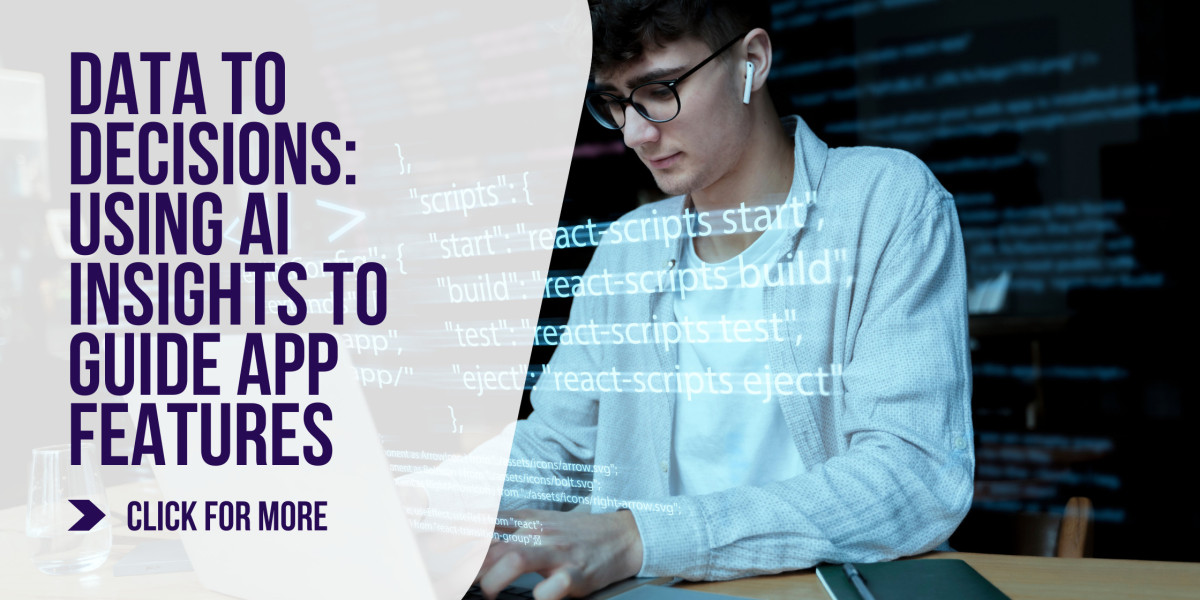In the fast-paced world of mobile app development, the key to staying ahead of the curve is making informed decisions. And what better way to make decisions than by relying on data? But it's not just about collecting data—it's about interpreting that data and using it to guide strategic decisions, particularly when it comes to app features.
This is where artificial intelligence (AI) comes into play. By analyzing user behavior, performance metrics, and engagement patterns, AI can provide actionable insights that help developers make smarter decisions on which features to prioritize. In this blog, we’ll explore how data-driven decisions, powered by AI insights, are shaping the future of mobile app development and why this approach is crucial for building apps that resonate with users.
The Evolution of Mobile App Development: From Gut Feelings to Data-Driven Decisions
Historically, app development often relied on intuition and guesswork. Developers would brainstorm ideas for features, make educated guesses about what users might like, and build accordingly. Feedback came after the app was released, which meant that developers had little to no control over the app’s reception until it was too late.
Fast forward to today, and the landscape has changed dramatically. With the rise of AI and data analytics, app development has become a much more strategic process. Instead of relying on hunches or assumptions, developers now have access to powerful tools that help them understand user needs, preferences, and pain points. This shift from gut-feeling decisions to data-driven decisions has redefined how mobile apps are created and optimized.
Understanding AI’s Role in App Development
Before diving into how AI helps guide app feature decisions, let’s take a moment to understand the role AI plays in the broader context of app development.
At its core, AI refers to systems and algorithms that mimic human intelligence to perform tasks like learning, problem-solving, and decision-making. In the realm of mobile apps, AI is typically applied in areas like:
Personalization: Tailoring content, recommendations, and user experiences based on individual preferences.
Automation: Streamlining tasks such as testing, data analysis, and even customer support.
Predictive Analytics: Forecasting future trends and user behavior based on historical data.
Natural Language Processing (NLP): Enhancing user interaction with chatbots, voice assistants, and sentiment analysis.
When it comes to feature decision-making, AI can offer invaluable insights into how users interact with an app and what features they find most valuable. These insights empower developers to build features that meet user needs, solve problems, and improve engagement.
The Power of Data: Gathering Insights for Smarter Decisions
The first step in using AI to guide app features is data collection. Mobile apps generate a wealth of data every time they are used. This includes everything from user interactions (like clicks, swipes, and time spent on specific screens) to more complex metrics like in-app purchases, session lengths, and error reports.
By collecting and analyzing this data, AI systems can uncover patterns and trends that human developers might miss. These insights can help developers identify which features are most popular, which ones are underused, and where users are encountering problems.
Key Data Points AI Can Analyze to Guide App Features:
User Engagement Metrics: How often users interact with the app, which features they use the most, and how long they spend on specific screens.
Session Duration: Understanding how long users are staying in the app and which features are keeping them engaged.
Drop-Off Points: Identifying where users are abandoning the app or specific tasks, which could indicate friction points that need attention.
Feature Adoption Rates: Analyzing how many users are actually using new features versus those that remain inactive.
User Feedback and Reviews: AI can process customer reviews and feedback, providing sentiment analysis that helps developers understand user satisfaction.
By gathering and processing this data, AI systems can help developers make more informed decisions about what features to prioritize in future updates.
Turning Insights Into Action: AI-Driven Feature Prioritization
Now that we understand how data is collected, let’s look at how AI can help guide feature development decisions. AI-powered insights can help developers identify which features are most valuable to users and should be prioritized, as well as those that may need improvement or even removal.
Here’s how AI can help developers make more strategic decisions about app features:
1. Prioritizing Features Based on User Demand
AI can reveal which features are getting the most traction among users. For example, if a particular feature has high engagement rates, such as in-app messaging or a product recommendation engine, AI can highlight this as a high-priority area for further development. Conversely, if a feature has little usage or negative feedback, it may be time to rethink it.
2. Identifying Pain Points and Friction Areas
AI-driven insights can also help developers understand where users encounter problems. For instance, if users are frequently abandoning the app at a particular step in the sign-up process, this could indicate a friction point that needs to be addressed. By analyzing user flows and behavior, AI can pinpoint exactly where the drop-offs are occurring, giving developers clear action points to improve the app experience.
3. Predicting Future Feature Trends
AI excels at predicting future trends based on historical data. By analyzing past user behavior, AI can forecast which features might become more popular in the future or anticipate emerging user needs. For example, if users are increasingly engaging with augmented reality (AR) features, AI might recommend expanding the app’s AR capabilities to meet the growing demand.
4. Optimizing Existing Features for Better Performance
It’s not always about adding new features; sometimes, it’s about refining existing ones. AI can help developers understand how well current features are performing and provide recommendations for improvements. For example, if a particular feature is slow or causing crashes, AI can analyze usage patterns and suggest optimizations to improve speed and stability.
5. A/B Testing and Iteration
A/B testing is a critical part of feature optimization. AI can enhance A/B testing by automatically analyzing test results, recognizing patterns, and suggesting the best-performing versions of features. This iterative approach allows developers to fine-tune app features and make data-backed decisions on which variations work best for the user base.
The Role of Personalization in Feature Development
One of the most compelling ways AI can influence feature development is through personalization. Personalization has become a key differentiator for mobile apps in today’s competitive market. Users expect apps to understand their preferences and tailor experiences to suit their individual needs.
AI-driven personalization involves using data about user behavior, preferences, and demographic information to deliver personalized content, recommendations, and features. By integrating personalized features into your app, you not only enhance the user experience but also create an app that adapts to the evolving needs of users.
For example, a fitness app might use AI to suggest personalized workout plans based on a user’s goals, progress, and activity patterns. Or a shopping app might recommend products based on a user’s previous purchases and browsing history. These personalized experiences help keep users engaged and encourage continued use of the app.
Leveraging AI for Continuous Improvement
AI isn’t just about making one-time decisions; it’s about ongoing optimization. By continuously collecting and analyzing data, AI allows developers to make iterative improvements to their apps over time. This ongoing feedback loop ensures that the app remains relevant and aligned with user needs, even as those needs change.
This is particularly important in the world of mobile apps, where trends and user preferences can shift rapidly. By leveraging AI to monitor app performance, track user behavior, and refine features based on real-time insights, developers can ensure that their apps stay ahead of the competition.
Why Working with Expert Developers Matters
While the potential of AI in guiding app feature decisions is clear, implementing AI insights requires a skilled development team. It’s not just about having access to AI tools; it’s about understanding how to leverage those tools effectively to make smart decisions that improve the user experience.
This is where experienced app developers in Atlanta GA come in. With a deep understanding of both mobile app development and AI technology, these developers can help you integrate AI-driven insights into your app’s feature development process. Their expertise ensures that AI is used in a way that maximizes its potential, leading to smarter decisions, more relevant features, and a better overall user experience.
Conclusion
The future of mobile app development is driven by data, and AI is at the forefront of this revolution. By using AI to gather insights, prioritize features, and continuously optimize the user experience, developers can create apps that meet the evolving needs of users. Data-driven decisions not only enhance app performance but also ensure that features are aligned with user preferences, ultimately leading to higher engagement and satisfaction.
If you’re ready to take your mobile app to the next level and make data-driven decisions that guide feature development, partnering with the right developers is crucial. Skilled app developers in Atlanta GA can help you harness the power of AI to create an app that truly resonates with your audience, driving long-term success and growth.








